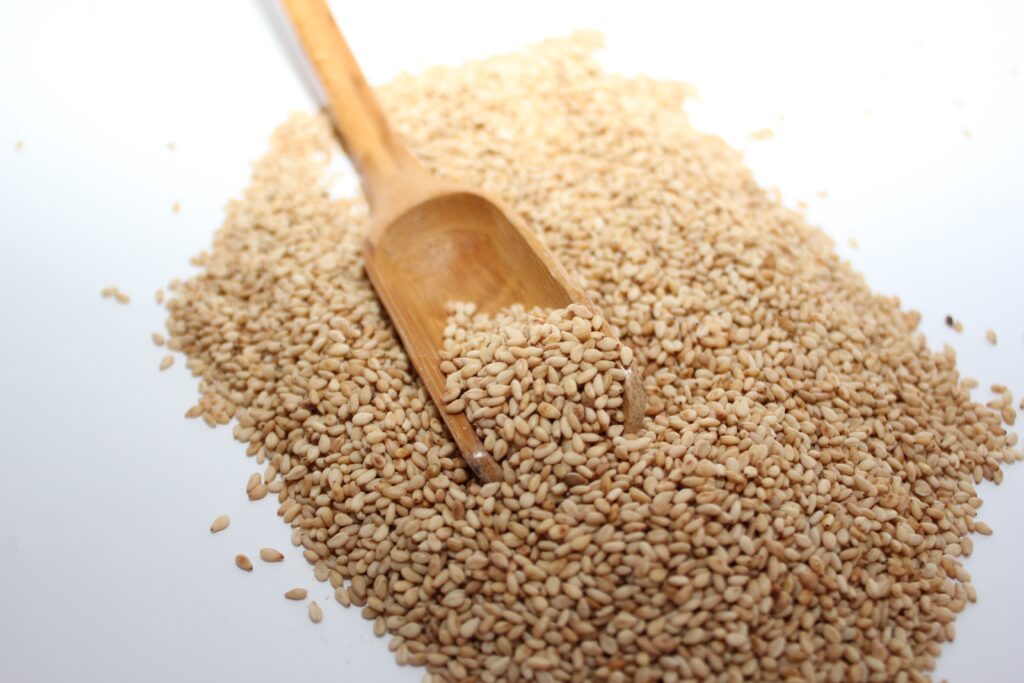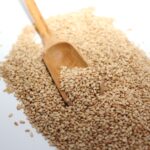11 health benefits of sesame Sesame seeds, often referred to as the “wonder seeds,” are tiny but mighty when it comes to nutrition and health benefits. These small seeds, which come from the sesame plant (Sesamum indicum), have been used in culinary traditions around the world for centuries. Packed with essential nutrients, they offer a variety of health benefits that can enhance overall well-being. Here are 11 health benefits of sesame:

1. Rich in Nutrients
Sesame seeds are a nutritional powerhouse. They are rich in essential vitamins and minerals, including calcium, magnesium, iron, phosphorus, and B vitamins. Just a small serving can contribute significantly to daily nutritional needs.
2. Heart Health
Sesame seeds are known to support heart health due to their high levels of unsaturated fats, particularly omega-6 fatty acids. These healthy fats can help reduce bad cholesterol levels, thereby lowering the risk of heart disease. Additionally, sesame contains lignans, which have been shown to promote cardiovascular health.
3. Bone Health
With their impressive calcium content, sesame seeds are excellent for bone health. Calcium is crucial for maintaining strong bones and preventing osteoporosis. They also contain other bone-friendly nutrients, such as magnesium and zinc, which play vital roles in bone density.
4. Antioxidant Properties
Sesame seeds are rich in antioxidants, such as sesamolin and sesamin. These compounds help combat oxidative stress and may protect against chronic diseases by neutralizing harmful free radicals in the body.
5. Anti-Inflammatory Effects
The compounds found in sesame seeds can help reduce inflammation in the body. This is particularly beneficial for individuals suffering from inflammatory conditions such as arthritis, as a diet rich in anti-inflammatory foods can aid in managing symptoms.
6. Blood Sugar Regulation
Sesame seeds have been shown to have a positive effect on blood sugar levels. They contain compounds that may improve insulin sensitivity and help stabilize blood sugar, making them a good addition to the diet for individuals with diabetes or those looking to maintain healthy blood sugar levels.
7. Skin Health
The antioxidants and healthy fats in sesame seeds can promote healthy skin. They help retain moisture, reduce dryness, and may even protect against skin aging. Additionally, sesame oil is often used in topical applications for its nourishing properties.
8. Digestive Health
Sesame seeds are a good source of dietary fiber, which is essential for healthy digestion. Fiber aids in regular bowel movements and can help prevent constipation. Incorporating sesame seeds into your diet can contribute to overall digestive health.
9. Weight Management
Despite being high in calories, sesame seeds can aid in weight management. Their combination of protein, fiber, and healthy fats promotes satiety, helping you feel full longer. Including them in meals can reduce overall calorie intake.
10. Hormonal Balance
Sesame seeds contain phytoestrogens, which can mimic the effects of estrogen in the body. This property can be particularly beneficial for women experiencing hormonal fluctuations during menstruation or menopause. The seeds may help alleviate symptoms such as hot flashes and mood swings.
11. Versatile Culinary Use
Beyond their health benefits, sesame seeds are incredibly versatile in the kitchen. They can be sprinkled on salads, added to stir-fries, blended into smoothies, or used to make tahini and sesame oil. Their nutty flavor enhances a variety of dishes, making it easy to incorporate them into your diet.
Conclusion:
Incorporating sesame seeds into your daily diet can provide a myriad of health benefits. From supporting heart health to promoting skin vitality, the 11 health benefits of sesame make them a valuable addition to any meal. Whether you enjoy them raw, toasted, or in oil form, these tiny seeds pack a nutritional punch that supports overall well-being. As with any food, moderation is key, so consider adding sesame seeds to your meals for a simple yet effective way to boost your health.
What Happens If We Eat Sesame Daily?
Eating sesame seeds daily can provide numerous health benefits, including:
Nutrient Boost: Regular consumption can help ensure you meet your daily requirements for essential vitamins and minerals like calcium, magnesium, and iron.
Heart Health: Daily intake may improve heart health by lowering cholesterol levels and promoting better blood circulation due to the healthy fats and antioxidants present in sesame seeds.
Bone Strength: Consuming them regularly can support bone health thanks to their high calcium content.
Digestive Health: Their fiber content can aid in digestion and prevent constipation.
Weight Management: Daily inclusion may help with satiety, potentially reducing overall calorie intake.
Are Sesame Seeds Good for Girls?

Yes, sesame seeds are beneficial for girls and women in various ways:
How Many Sesame Seeds Should I Eat a Day?

A typical serving size is about 1 to 2 tablespoons (around 15 to 30 grams) of sesame seeds per day. This amount provides a good balance of nutrients without excessive calorie intake. However, individual dietary needs can vary, so it’s important to consider your overall diet and health goals.
Can We Eat Sesame Seeds at Night?
Yes, you can eat sesame seeds at night. They are nutritious and can be a healthy snack. Their magnesium content may even help promote relaxation and improve sleep quality. However, if you have any digestive issues, it’s best to monitor your body’s response, as eating any seeds or nuts close to bedtime can affect some people differently.









































